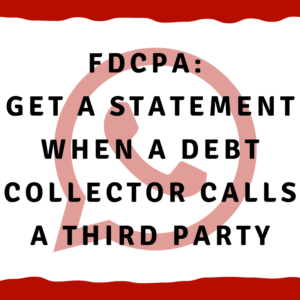FDCPA: Get a statement when a debt collector calls a third party
FDCPA: Get a statement when a debt collector calls a third party
One of the most terrible violations of the Fair Debt Collection Practices Act (FDCPA) that debt collectors make is contacting a third party about a debt.
What is a “third party”?
A third party is anybody other than you, your spouse, or your lawyer.
Everyone else in the world is a third party.
There are very strict rules about when a debt collector can contact a third party, but collectors love to do this because it is so effective.
When your neighbor, your ex-mother-in-law, or your boss calls you and says they are getting calls from a collector about you it puts tremendous pressure on you.
They won’t say what it’s about but they will keep asking people to give messages to you.
That puts a tremendous amount of pressure on you so that’s why they do it.
It’s very effective, it’s very illegal, and these lawsuits have a tremendous value when we sue debt collectors for doing this.
When you know that a debt collector is contacting a third party, get proof from that third party.
You want that third party to give you proof that they received the call.
How can they prove this?
Take a look at their phone. Take a screenshot.
This shows the phone number, the date, and how long the call lasted.
And then when they send this to you by email or text, they can type a summary of what happened.
Here’s an example of what the statement would look like:
“Hey, I got this call from a lady named Cynthia. She wouldn’t tell me who she was with. She only said that it is a very important business matter and that it is absolutely critical that you call her back. She says that you will be in big trouble if you don’t.”
If they recorded the call, they can send you the recording.
If they get a voicemail, they can forward you the voicemail.
Even if they do not have a screenshot because it came on their home phone and they don’t have caller ID, they can type you an email.
Or even in a text, they can describe their conversation in as much detail as possible.
Keep the statements factual.
They don’t need to say they are sending this so that you can sue. They just need to focus on the facts.
List the date, the time, the phone number, the name of the person who called, what they said, in as much detail as they can give.
We do not want them to exaggerate the event, but we also do not want them to play it down.
Using only straight facts, tell what happened.
If they can do this, this will make it much better for you if you are suing a debt collector for calling a third party.
Occasionally the collectors will do this legally.
Most of the time when they do this, it is illegal and they should be sued for this.
We sue these collectors under the FDCPA.
This means you can get emotional distress damages, economic damages, and attorney’s fees.
We also tend to sue under “invasion of privacy” and other Alabama torts.
They didn’t accidentally call your neighbor 5 times. This was intentional and malicious.
When we can show reckless, wanton, intentional, or malicious behavior, then we have the potential to get punitive damages.
Punitive damages have two main purposes.
The first purpose is to punish the person that did the bad thing.
We want to punish them because it was more than negligence.
They were careless and you need to be compensated.
They should be punished for their intentionally reckless behavior.
The second purpose is to send a message that deters both this company and all other debt collectors from making the same mistake.
When we sue and get punitive damages and get punitive damages against the company for talking to your parents, this punishes the company.
Once they are punished, they will not want to do this again.
This also sends a message to other debt collectors to not talk to third parties.
They’ll say, “Remember what happened in Birmingham / Huntsville / Mobile, Alabama? Those guys got hammered for doing that. Let’s not do this. We don’t want to get hit with punitive damages.”
This is the point of punitive damages.
So, if you have a debt collector calling you fiancé or your adult child…
This is not you, this is not your lawyer, and this is not your spouse.
This is a third party.
If this is happening to you, get proof and get with a lawyer that sues debt collectors.
If you live in Alabama and you have any questions, feel free to get in touch with us.
We would be glad to help you in any way we can.
You can reach us by phone at 1-205-879-2447, or you can fill out a contact form and we will get in touch with you quickly.
Thanks for reading, and have a great day!
